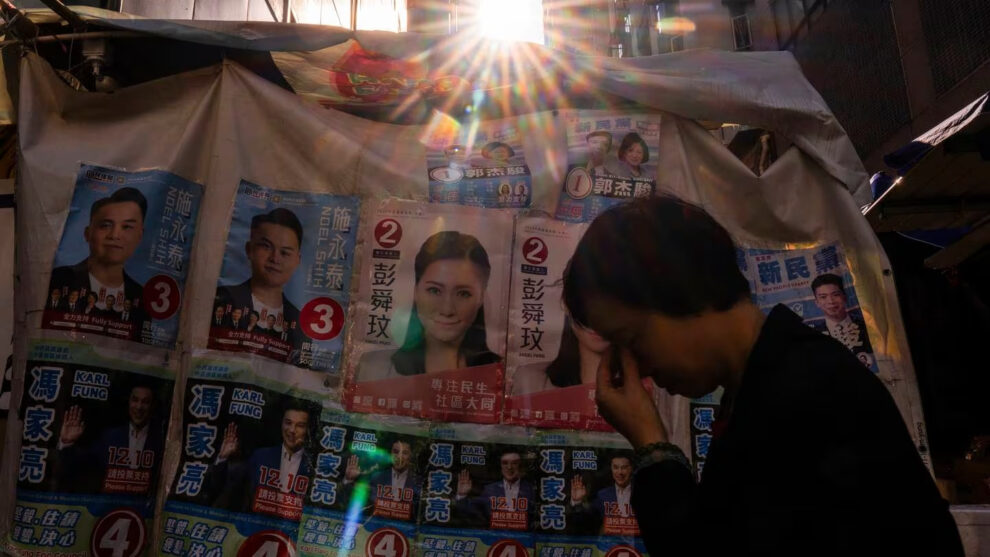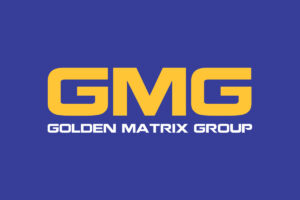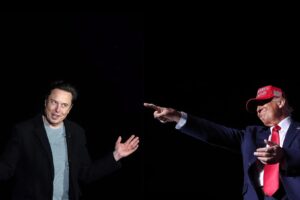One of the Hong Kong’s longest-serving pro-democracy council members is organizing a farewell party with her residents in late December. Another democratic council member isn’t running for reelection to the post that has come to define him in recent years.
As more obstacles are placed in front of candidates, the pool is thinning and becoming less politically diverse, leaving mostly “patriots,” those loyal to mainland China, in the running. And with such slim options, some voters say they won’t participate.
Sunday’s district council elections will be absent of pro-democracy candidates for the first time in about four decades. Some of them chose to opt out, while others were unable to gather the requisite nominations to qualify — a hurdle that proved difficult to clear even for some pro-government politicians.
During her 38-year tenure, Winnie Poon made history as the first popularly elected female council member in Kwun Tong district and witnessed the councils become more democratic. She said she’s stepping down because of her age, but also because she’s “uninterested in playing this game” anymore, envisioning a future where councilors, who primarily handle municipal matters such as organizing construction projects and public facilities, instead serve to back the city government’s ideas.
“After a long journey, I realized, ‘Oh, there’s another starting point,’” she said. “It’s even further back than where I originally started.”
Jay Li, one of Hong Kong ’s remaining pro-democracy district councilors, decided not seek reelection this year after the government’s electoral overhaul.
At the height of the pro-democracy protests in 2019, Li and his colleagues rode a wave of anti-government sentiment to a landslide victory in the municipal-level elections. Representing residents of Sham Shui Po, one of Hong Kong’s poorest districts, Li’s commitment was to improve the community through a bottom-up approach.
But for Li, the new election rules raise the cost of running and undermine the legitimacy of elections.
An amendment passed in July eliminates most directly elected seats on local district councils, the last major political representative bodies mostly chosen by the public, from some 90% to about 20% — a level even lower than when these bodies were first introduced in the 1980s under British rule. It also requires candidates to secure endorsements from at least nine members of government-appointed committees that are mostly packed with Beijing loyalists, making it virtually impossible for their pro-democracy rivals to run.
“It’s going backward. How much effort will it take to get back to where we were?” he said. “My heart is very tired.”
The lack of diversity in Hong Kong’s grassroots politics is widely seen as a result of the government’s crackdown on the pro-democracy movement following the 2019 protests — the most concerted challenge to Beijing since the former British colony returned to China’s rule in 1997. China had promised the territory could retain its civil, economic and political liberties for 50 years under the “one country, two systems” framework. But in recent years, the Hong Kong government has severely limited rights to free speech and assembly and virtually eliminated political opposition under the rubric of maintaining national security.
The pro-democracy camp’s stunning win in the last elections four years ago was a clear rebuke to the government’s handling of the 2019 protests.
Yet Li’s party, the Hong Kong Association for Democracy and People’s Livelihood, which is famous for its dedication to serving low-income residents, was unable to field any candidates for the first time since its founding in 1986.
Kwok Wai-shing, Li’s colleague who intended to run, tried to secure nominations by emailing all local committee members — calling some of them and even contacting multiple members through the networks of his senior colleagues. But the effort failed, with some of them simply saying it was “inconvenient for them to reply,” Kwok said.
“The committee members may not solely consider one’s abilities and experience, or whether they love Hong Kong and China,” he said.
Pro-Beijing lawmaker Michael Tien’s political group also faced difficulties in securing nominations.
In October, Tien told reporters that four members in his group tried to visit about 240 nominators, but 200 of them did not answer the door and 15 others refused to listen to their platform. Only one member of his group obtained sufficient endorsements to run.
“When some committee members and chairpersons have political affiliation, this is very unfavorable to other groups like us that do not have many people who are also committee members,” he told The Associated Press. “There’s no chance to introduce ourselves.”
About 70% of the hopefuls running for a seat in the geographical constituencies sit on one of the three committees that are responsible for endorsing candidates, according to a count by the AP.
The polls have become “small-circle” elections, said John Burns, an honorary professor of politics and public administration at the University of Hong Kong. The exclusion of all but official patriots reflects the government’s preference for obedient councils, Burns said. The new councils would be unlikely to reflect the city’s diverse opinions, he said, undermining their crucial role as a bridge connecting the government to the community.
“They become official patriots reflecting other official patriots’ opinions,” he said.
But the Home Affairs Department insisted the new nomination rule is reasonable, citing a court dismissal of a judicial review against the requirement on Dec. 1.
Judge Russell Coleman ruled that there was insufficient evidence to suggest the pro-democracy camp’s failures to secure enough nominations were due to unfairness in the new rule.
The department says the requirement helped ensure the candidates are recognized by those who are familiar with district affairs.
Chris Ip, a pro-Beijing politician trying to make a comeback to the council after losing in 2019, said it’s impossible for those who worked in the district for a long period not to know any of the committee members. Ip, who sits on one of the committees, said after the overhaul, candidates put a stronger emphasis on their platforms and councilors are better able to focus on their constituents’ livelihoods.
Some pro-democracy voters aren’t buying it, and plan to turn their backs on the election. When Chow Tak-wing, a supporter of Kwok, learned that Kwok could not join the race, he decided not to vote too.
But Hong Kong leader John Lee and other officials are repeatedly appealing to the public to vote, determined to boost the turnout rate. The government planned various promotional activities, including game booths, an outdoor concert and offers of free visits to some museums. Advertisements were posted across subway stations. The city’s prominent airline Cathay Pacific Airways also offered discount airfare for passengers traveling back from mainland China to Hong Kong, saying its aim is to help residents “actively participate” in the polls.
While the government is working to spotlight the elections, council members like Poon and Li are preparing for their exits under the sharply shifting political landscape.
Without council seats, his party would have even fewer resources to sustain its operations, Li said.
“In the past, we would say, ‘Let’s see what dishes we have and eat,’ but now we don’t have money to cook,” he said.










